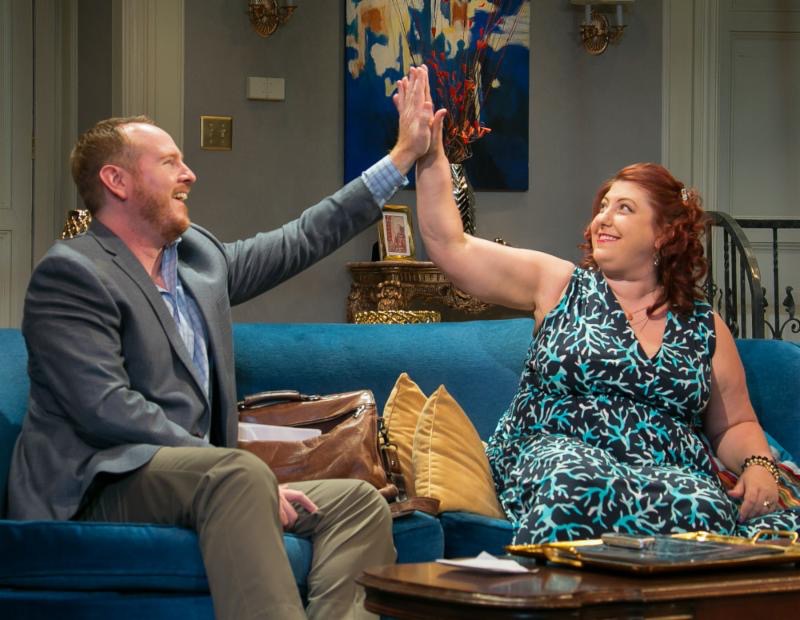
[caption id="attachment_51887" align="alignnone" width="800"] Darren Goldstein rduousnd Ashlie Atkinson in "The Forgotten Woman." Lenny Stucker photos.[/caption]
Darren Goldstein rduousnd Ashlie Atkinson in "The Forgotten Woman." Lenny Stucker photos.[/caption]
By Annette Hinkle
The world of opera is full of drama and angst, both on stage and off, and much of that turmoil finds its way onto the Bay Street stage in “The Forgotten Woman,” Jonathan Tolins insightfully endearing play which is currently enjoying its world premiere at the theater.
[caption id="attachment_51889" align="alignleft" width="207"]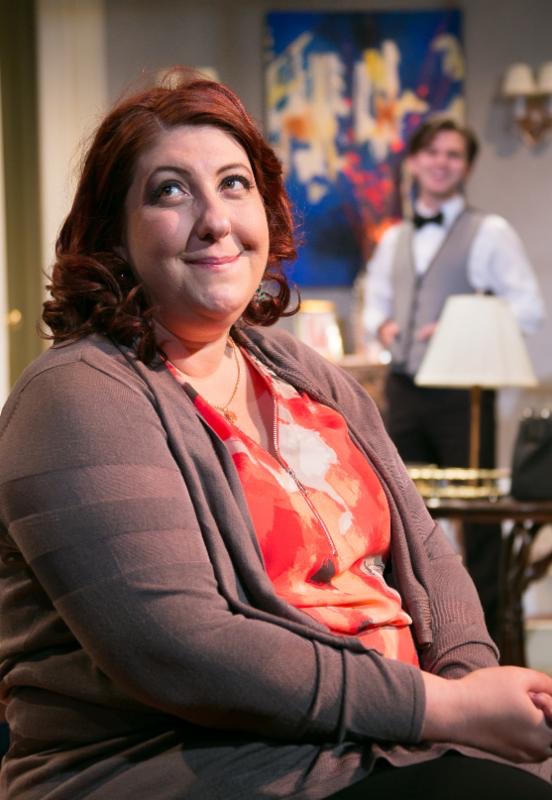 Ashlie Atkinson and Justin Mark in "The Forgotten Woman."[/caption]
Ashlie Atkinson and Justin Mark in "The Forgotten Woman."[/caption]
Set in the Chicago hotel suite of rising opera star Margaret Meier (Ashlie Atkinson), “The Forgotten Woman” deals with issues of expectation and disappointment, ego, love and self-image in a society that values the thin and the beautiful.
It’s also about the cultivation of a fading art form struggling to stay relevant in a world that has largely lost interest. But if you’re one of those who think opera has no place in this digital age, think again. This smart and cleverly constructed play — in truth, an opera outside an opera — proves that though times may change, human nature never does.
Entering Margaret’s hotel room early in the action is Steve Powell (Darren Goldstein), a Chicago newspaper reporter who’s there to do a profile on Margaret’s upcoming role in Richard Strauss’ “Ariadne auf Naxos,” an opera about a lonely woman forced to live in exile on an isolated island.
Margaret is that lonely woman — on stage and off — and orchestrating her every move is her manager, Erick (Mark Junek), and her composer/husband Rudolph (Robert Stanton). Margaret is obviously a commodity and the two work hard to keep her focused and shielded from criticisms of the wider world, particularly where her fluxuating weight is concerned, which has been a source of public debate. Though initially their actions seem well intentioned, in fact, both Erick and Rudy have ulterior motives for keeping Margaret literally fat and happy — respective job security. For that reason, also flitting in and out of the room is a chatty bellhop, Jordan (Justin Mark), who has been instructed to ensure that plenty of fattening foods are on hand for her at all times.
[caption id="attachment_51888" align="alignright" width="300"]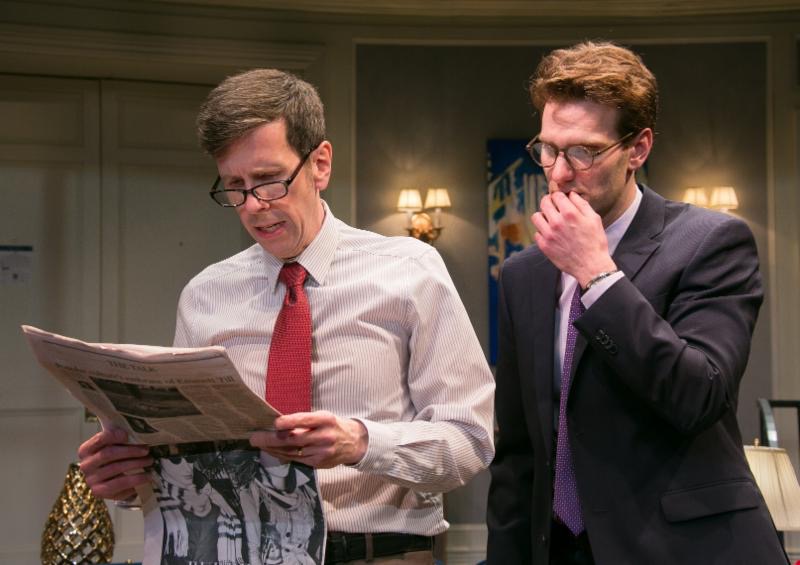 Robert Stanton and Mark Junek in "The Forgotten Woman."[/caption]
Robert Stanton and Mark Junek in "The Forgotten Woman."[/caption]
Steve’s appearance on the scene threatens to upend it all in short order. Both Erick and Rudy are wary of his presence, especially after Steve admits that Oprah, not opera, is his regular beat. Lightweight celebrity profiles are his usual fare and he’s just filling in for the paper’s ailing music critic, which leads Erick and Rudy to fear his will be a hatchet piece on Margaret.
But Steve has ulterior motives of his own for doing this interview. It turns out he and Margaret are old high school chums and he understands her in ways the other men in her life do not, leading Margaret to envision the kinds of scenarios that can plague those in their middle years and middle careers. Among them, how do choices we make early on in life play out down the road? What happens when a second chance appears long after we thought such things were possible?
[caption id="attachment_51891" align="aligncenter" width="800"]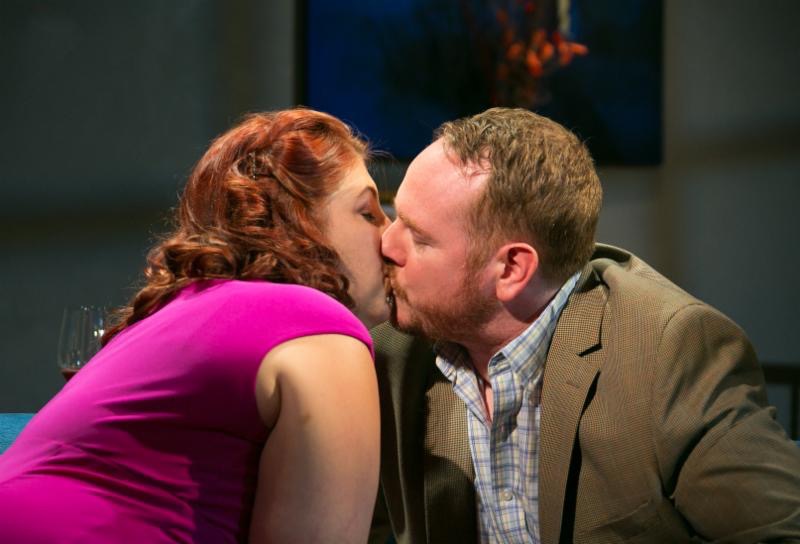 Ashlie Atkinson and Darren Goldstein in "The Forgotten Woman."[/caption]
Ashlie Atkinson and Darren Goldstein in "The Forgotten Woman."[/caption]
Playwright Jonathan Tolins has written a brilliantly astute piece that weaves real life issues into the operatic realm without ever being preachy or farcical. Beyond understanding the human condition that leaves us questioning our place in the world and coping with feelings of inadequacy, this playwright obviously knows and respects opera as an art form and pays homage to it without ever turning it into mockery. Yes, there is a good deal of “inside baseball” here as characters reference impossible to pronounce operatic names and arias that few in the audience may be familiar with, but Mr. Tolins has structured his play in such a way that it’s all done for Steve’s benefit, and his ignorance of opera is our own. Even those without an ounce of operatic knowledge will at least come to appreciate it as an art form.
This play treads over a lot of territory and director Noah Himmelstein does an outstanding job of getting the players there in an engaging way. Because this is opera, explanations are necessary, particularly in act one, and Mr. Himmelstein covers the ground nicely without losing much needed momentum or the audience’s attention.
[caption id="attachment_51890" align="alignleft" width="300"]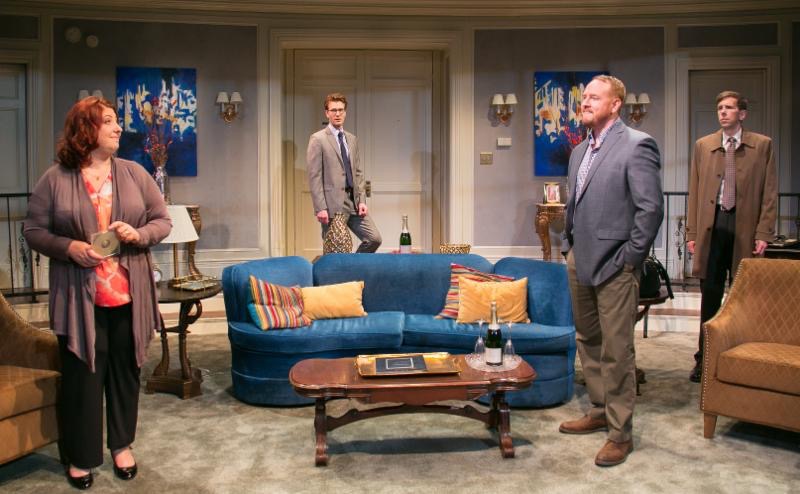 Ashlie Atkinson, Mark Junek, Darren Goldstein and Robert Stanton in "The Forgotten Woman."[/caption]
Ashlie Atkinson, Mark Junek, Darren Goldstein and Robert Stanton in "The Forgotten Woman."[/caption]
But this is not a dumbed-down script. Those who love opera will appreciate the nuanced descriptions and subtle references to productions they are familiar with and may recognize some operatic plot lines that mirror the action on stage. Also building appreciation for the subject matter is Tim Mackabee’s functionally elegant set (with lighting by David Lander and sound by Elisheba Ittoop) which shifts from practical to sublime when all is right in Margaret’s muddled world. That’s when the lights fade on stage and a beautifully rendered Chagall-inspired cyclorama is revealed behind, accompanied by soaring musical scores.
It all adds up to a charming play that invites understanding with a liberal dose of humor. Not an easy line to tread, but this stellar cast pulls it off, each member bringing his or her own unique stamp to the piece.
The stand out among the players is the immensely talented and imposing Ashlie Atkinson whose Margaret is a big, brash soprano with a singing career that is largely accidental. Despite her considerable talent, she’s a tough-talking small town girl who doesn't take the art form, or herself, too seriously — a refreshing reinvention of the backstage spoiled diva most opera-themed narratives put forth.
Ms. Atkinson takes what could easily be stereotype and elevates it to a new height. Her character’s frankness is simultaneously hilarious and heartbreaking in that it’s clearly a thinly veiled attempt to disguise deeply ingrained insecurities that many women — especially those with a few extra pounds — carry throughout their lives. Those insecurities are compounded by a less than amorous marriage, the feeling she’s being used, and doubts about her mothering skills which have taken a back seat to a career she’s not even sure she wants.
Meanwhile, it takes Steve (marvelously portrayed by Mr. Goldstein), the old high school friend, to make her feel truly beautiful inside and out. His flattering attention takes her vocal skills to a new level as she wantonly disavows singing advice from her manipulative husband. As a result, the music emanates from somewhere deep inside —that place where confidence lives — and for the first time in her life, she’s comfortable in her own skin.
But like the giddy first days of romance itself, that level of brilliance is ultimately unsustainable both on stage and in life. A fleeting mirage for one beautiful moment not destined to last. Like Ariadne, the role she sings on stage, Margaret is soon isolated on her island and consumed by the longing a lost friend has reawakened in her.
It’s a prime example of art imitating life. Which is why when it comes to opera, “The Forgotten Woman” reminds us that it truly is never over — even after the fat lady sings.
The world premiere of Jonathan Tolins “The Forgotten Woman” is produced in association with Catherine Adler and runs now through June 19 at Bay Street Theater with shows Tuesday through Sunday. For tickets, call 725-9500 or visit baystreet.org.